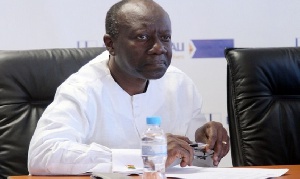Finance Minister, Ken Ofori-Atta, says he is optimistic about achieving the macro-economic targets contained in this year’s budget statement.
In the 2017 budget statement, which was approved by Parliament this week, government is aiming to reduce its budget deficit from 8.7 percent to 6.5 percent of Gross Domestic Product (GDP) in 2017; an end-year inflation target of 11.2percent; and an overall real GDP (including oil) growth of 6.3percent.
“It was an overwhelming approval by Parliament and we are grateful for that. We expect to be able to meet the targets that we have and we look forward to a good year,” he told B&FT in an interview.
His comment follows the approval of four tax bills by the 275-member legislature to enable government enforce tax cuts outlined in its maiden 2017 budget statement.
The four bills passed include: the Income Tax (Amendment) Bill, 2017; Special Petroleum Tax (Amendment) Bill, 2017; Special Import Levy (Amendment) Bill, 2017; and the Customs and Excise (Petroleum Taxes and Petroleum Related Levies) (Repeal) Bill, 2017.
Explaining the rationale for the approval of the tax bills, the Chairman the Finance Committee of Parliament, Dr. Mark Assibey-Yeboah indicated that it was imperative that government’s quest to restore fiscal consolidation and spur growth through these tax bills are approved.
The Income Tax (Amendment) Bill, 2017, now makes it possible to tax-exempt gains made on securities listed on the stock exchange.
The Special Import Levy (Amendment) Bill, 2017 now gives effect to the removal of levies payable on specific imported goods.
The Special Petroleum Tax Act,2014(Act 879) is to amend the Petroleum Tax Act,2014 to reduce the rate of the Special Petroleum Tax on petroleum products specified in the Schedule to Act 879 from seventeen and a half percent(17.5%) to fifteen percent(15%).
Furthermore, the Customs and Excise (Petroleum Taxes and Petroleum Related Levies) (Repeal) Bill, 2017 is to give effect to the removal of the rates of excise duty on petroleum products.
Following a challenging economic phase, the John Mahama-led government turned to the International Monetary Fund for support.
A three-year IMF facility for balance of payments support was signed April 2015, with the US$918 million expected to be disbursed in eight equal tranches for the observance of the performance criteria and completion of reviews under the programme.
The objectives of Ghana going to the IMF for the bailout was to restore debt sustainability and macroeconomic stability, to foster a return to high growth and job creation through agriculture, and infrastructure investment, while protecting social spending;
It was also to strengthen the BoG’s monetary policy framework, while taking measures to ensure its full effectiveness and rebuild external buffers.
The Nana Addo Dankwa Akufo-Addo-led administration has, however, given indications that it is likely to renegotiate the IMF deal.
Business News of Friday, 17 March 2017
Source: b&ft.com

















